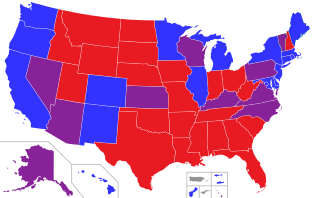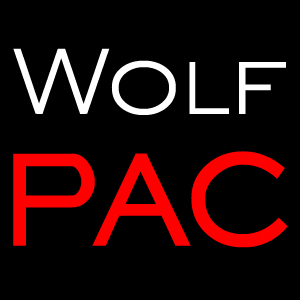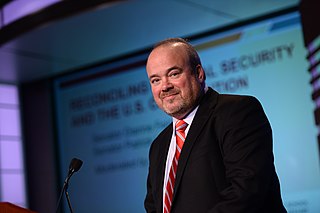Related Research Articles

A state legislature in the United States is the legislative body of any of the 50 U.S. states. The formal name varies from state to state. In 27 states, the legislature is simply called the Legislature or the State Legislature, while in 19 states the legislature is called the General Assembly. In Massachusetts and New Hampshire, the legislature is called the General Court, while North Dakota and Oregon designate the legislature the Legislative Assembly.
Ronald L. Rice was an American Democratic Party politician who served in the New Jersey State Senate from 1986 to 2022. He represented the 28th Legislative District. Rice is one of the longest-serving state senators in New Jersey history.

The financing of electoral campaigns in the United States happens at the federal, state, and local levels by contributions from individuals, corporations, political action committees, and sometimes the government. Campaign spending has risen steadily at least since 1990.
The Cuban–American lobby describes those various groups of Cuban exiles in the United States and their descendants who have historically influenced the United States' policy toward Cuba. In general usage, this refers to anti-Castro groups.

Lobbying in the United States describes paid activity in which special interest groups hire well-connected professional advocates, often lawyers, to argue for specific legislation in decision-making bodies such as the United States Congress. It is a highly controversial phenomenon, often seen in a negative light by journalists and the American public, with some critics describing it as a legal form of bribery, influence peddling, and/or extortion. While lobbying is subject to extensive and often complex rules which, if not followed, can lead to penalties including jail, the activity of lobbying has been interpreted by court rulings as constitutionally protected free speech and a way to petition the government for the redress of grievances, two of the freedoms protected by the First Amendment of the Constitution. Since the 1970s, lobbying activity has grown immensely in the United States in terms of the numbers of lobbyists and the size of lobbying budgets, and has become the focus of much criticism of American governance.
In the United States, term limits, also referred to as rotation in office, restrict the number of terms of office an officeholder may serve. At the federal level, the 22nd Amendment to the United States Constitution limits the president of the United States to two four-year terms. State government offices in some, but not all, states are term-limited, including executive, legislative, and judicial offices.
Fredric Michael "Fred" Wertheimer is an American attorney, lobbyist, and activist notable for his work on campaign finance reform and other government integrity, transparency, and accountability issues.
The Cuban Liberty Council (CLC) is a not-for-profit organization whose stated goal is to promote liberty and democracy in Cuba.
Robert M. Stein is an American political scientist and Lena Gohlman Fox Professor of political science at Rice University. He is an expert in urban politics and public policy.
Advocacy groups, also known as interest groups, special interest groups, lobbying groups, pressure groups, or public associations use various forms of advocacy and/or lobbying in order to influence public opinion and ultimately public policy. They play an important role in the development of political and social systems.
Direct democracy refers to decision making or direct vote a proposal, law, or political issue by the electorate, rather than being voted on by representatives in a state or local legislature or council.
Direct lobbying in the United States are methods used by lobbyists to influence United States legislative bodies. Interest groups from many sectors spend billions of dollars on lobbying.

The history of lobbying in the United States is a chronicle of the rise of paid advocacy generally by special interests seeking favor in lawmaking bodies such as the United States Congress. Lobbying has usually been understood as activity by paid professionals to try to influence key legislators and executives, which is different from the right for an individual to petition the government. It has been around since the early days of the Republic, and affects every level of government from local municipal authorities to the federal government in Washington. In the nineteenth century, lobbying was mostly conducted at the state level, but in the twentieth century, there has been a marked rise in activity, particularly at the federal level in the past thirty years. While lobbying has generally been marked by controversy, there have been numerous court rulings protecting lobbying as free speech. At the same time, the courts have made no final ruling on whether the petition clause of the US Constitution covers lobbying.
Nolan Matthew McCarty is an American political scientist specializing in U.S. politics, democratic political institutions, and political methodology. He has made notable contributions to the study of partisan polarization, the politics of economic inequality, theories of policy-making, and the statistical analysis of legislative voting.

Wolf-PAC is an American nonpartisan political action committee formed in 2011 with the goal of adding an "amendment to the United States Constitution to ensure balance, integrity, and transparency to our national system of campaign finance".
The distributive tendency is the propensity of the United States Congress to lean towards distributive politics, especially to gain political support and credit claim. Through the distributive tendency, Congress’ bills evolve over the drafting process to become more broad and reaching with their benefits. Legislation that follows the distributive tendency has benefits that flow to many districts and can come in many forms, though in current day they are often monetary.
Bureaucratic drift in American political science is a theory that seeks to explain the tendency for bureaucratic agencies to create policy that deviates from the original mandate. The difference between a bureaucracy's enactment of a law and the legislature's intent is called bureaucratic drift. Legislation is produced by elected officials, but is implemented by unelected bureaucrats, who sometimes act under their own preferences or interests. Bureaucratic drift is often treated as a principal–agent problem, with the House, Senate and Presidency acting as principals and bureaucracy acting as the agent. The government seeks to control bureaucratic drift in a number of ways, most notably congressional oversight and procedural controls.
Edgar Lane was a professor of political science at the University of California Santa Barbara. He was the author and editor of many scholarly articles, book reviews, and a book on lobbying reform. He made substantial contributions to the regulation of lobbying by assisting the House Select Committee on Lobbying Activities (1950).

Lawrence R. Jacobs is an American political scientist and founder and director of the Center for the Study of Politics and Governance (CSPG) at the University of Minnesota. He was appointed the Walter F. and Joan Mondale Chair for Political Studies at the University of Minnesota's Humphrey School of Public Affairs in 2005 and holds the McKnight Presidential Chair. Jacobs has written or edited, alone or collaboratively, 17 books and over 100 scholarly articles in addition to numerous reports and media essays on American democracy, national and Minnesota elections, political communications, health care reform, and economic inequality. His latest book is Democracy Under Fire: Donald Trump and the Breaking of American History. In 2020, he was elected a Fellow of the American Academy of Arts and Sciences.
Virginia Gray is an American political scientist, currently the Robert Watson Winston Distinguished Professor of Political Science at the University of North Carolina, Chapel Hill. She studies public policy and interest groups with a particular focus on U.S. state politics. Her work on policy diffusion, which concerns how innovation in policies within one region can lead to adoptions of that policy by other regions, has been cited as foundational in developing that research topic.
References
- ↑ Political Science Faculty Rice University
- ↑ Faculty Profile: Keith E. Hamm Archived 2011-07-20 at the Wayback Machine Rice University